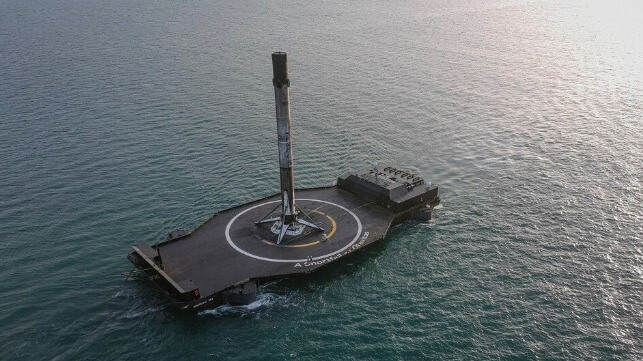ABS Secures Contract to Evaluate SpaceX's Unmanned Droneships

Serial entrepreneur Elon Musk is known for deploying technological developments early, rapidly and independently. His carmaker Tesla rolled out self-driving features for its vehicles in 2015, far ahead of competitors, and his spaceflight company SpaceX debuted an early unmanned vessel - a rocket landing barge with stationkeeping capability - in 2016.
Dubbed "droneships," these barge conversions have four thrusters, a blast shield to protect components, and a robot to secure landed rocket boosters. They are built to operate without manning during rocket landings.
Autonomous SpaceX droneship,
— Elon Musk (@elonmusk) July 9, 2021
A Shortfall of Gravitas pic.twitter.com/hNZ5U7nxUg
In 2021, with little fanfare, SpaceX built and deployed a fully autonomous droneship - a converted deck barge dubbed A Shortfall of Gravitas (ex name Marmac 302). The 10,000 dwt, 300-foot barge was converted at Bollinger's Port Fourchon yard last year and has been in active commercial service since last August. It is the company's first self-navigating, autonomous vessel, and (unlike its predecessors) it was designed to transit to its operating area without a tow.
After a year of operating the Gravitas, SpaceX has now contracted with ABS to evaluate the remote-control system architecture for one of its three unmanned vessels.

that matters most
Get the latest maritime news delivered to your inbox daily.
"Through our work on autonomous and remote-control technologies in projects with leading partners all over the world, ABS has been leading the way in supporting its practical application at sea," said Patrick Ryan, ABS Senior Vice President, Global Engineering and Technology. "We are proud that our capabilities in this area have been recognized by a true pioneer such as SpaceX."
The project will review the design of one of SpaceX’s unmanned at-sea rocket landing platforms for compliance with the ABS Guide for Autonomous and Remote-Control Functions. ABS will apply a risk-based approach to the evaluation of the vessel's autonomous functions.
